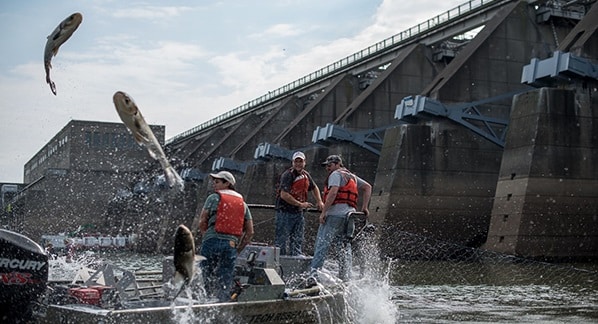The National Defense Authorization Act, or NDAA, is passed by Congress on an annual basis, guiding American military and defense spending. As the NDAA is often passed late in the congressional calendar, the package can become a vehicle for other bills and provisions beyond defense.
During the week of December 5, 2022, House and Senate leaders announced the inclusion of the Water Resources Development Act of 2022 (WRDA) and the Coast Guard Authorization Act in this year’s NDAA. These bills contained sportfishing industry priorities concerning habitat restoration, invasive species prevention and modernizing recreational access.
WRDA bills passed by the House and Senate earlier this year dedicated crucial funding to the Brandon Road Interbasin Project, a key project in the effort to stop the spread of invasive Asian carp. The Brandon Road Lock and Dam, situated between the Mississippi River Basin and the Great Lakes watershed, opens its gates to facilitate navigation, connecting the two watersheds. The Interbasin Project would install a combination of deterrents to prevent carp from migrating to Lake Michigan during lock openings. By increasing the federal government’s share of project costs from 80 to 90 percent, WRDA language included in the NDAA brings this critical project closer to fruition.
The NDAA also includes language from the Stop the Spread of Invasive Mussels Act of 2021. ASA worked with Congressional offices to craft bill language ensuring watercraft inspections and decontaminations to prevent the spread of zebra mussels and invasive aquatic plants do not compromise recreational access. Included in the NDAA are provisions from this bill directing federal agencies to consult with the Aquatic Nuisance Species Task Force to implement best decontamination practices to maintain angler access while keeping habitats healthy.
The NDAA also includes the following ASA priorities:
- Greater investments in invasive species control and prevention, including for programs preventing harmful algal blooms in the Great Lakes, the Louisiana coast and Lake Okeechobee.
- Reauthorization of the Coral Reef Conservation Program to address the threats that are causing the decline of our coral reef ecosystems.
- Incorporating public recreational amenities into ecosystem restoration projects on Army Corps lands.
- Studies on water supply conservation practices, which includes the use of nature-based solutions.
- A study on the economic benefits of recreational boating in the Great Lakes.
- Projects and studies to restore natural shorelines and riverbanks.
- A comprehensive study on Army Corps maintenance, construction and project needs for upgrades to recreation areas and facilities.
- Increased funding for the Army Corps’ Upper Mississippi River Restoration Program.
- Extending the Army Corps’ Asian carp prevention and control pilot program to the Tombigbee River.
- The development of an inventory of low-head dams, aiding federal and state agencies in locating safety hazards for recreational boaters.
The House passed the NDAA Thursday afternoon, sending it to the Senate for approval, which is expected next week. ASA thanks the many Congressional leaders who advocated for the recreational priorities included in this package, including Representative Peter DeFazio (D-Ore.), Senator Tom Carper (D-Del.), Senator Shelley Moore Capito (R-W.Va.), and Representative Sam Graves (R-Mo.).
Share This Article, Choose Your Platform:
Recent Posts



